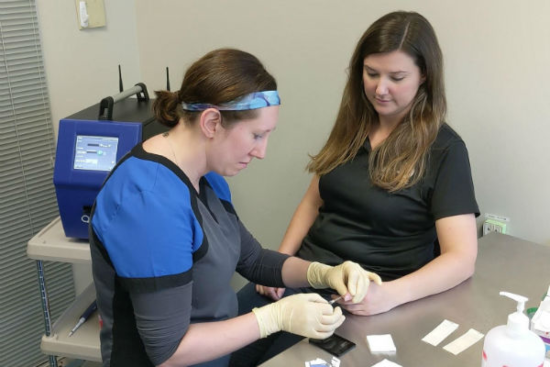
Federal Contract Supports AAD’s System to Detect Severe Infection

Morrisville-based Advanced Animal Diagnostics (AAD), a developer of rapid diagnostic and data systems for human and animal health, has been awarded a federal contract to develop a system for the earlier detection of severe infection, including sepsis, in humans.
The easy-to-use system is designed for use at point of care in urgent-care clinics, doctors’ offices, and other pre-hospital settings, and it could result in critical earlier intervention and improved patient outcomes, the company said in a news release.
Development of the system is being funded in part with $733,000 in federal funds from the Biomedical Advanced Research and Development Authority’s (BARDA) Division of Research, Innovation and Ventures. BARDA is part of the U.S. Department of Health and Human Services’ Office of the Assistant Secretary for Preparedness and Response.
Sepsis is a life-threatening medical emergency that happens when a person’s localized infection triggers a chain reaction, leading to a severe infection throughout the body. Infections that lead to sepsis most often start in the lung, urinary tract, skin or gastrointestinal tract, although almost any infection can trigger sepsis.
The vast majority of sepsis cases – 87%, according to the U.S. Centers for Disease Control and Prevention (CDC) – begin outside of a hospital.

“Having a test system that in about two minutes can give results patient-side that are typically only available in a hospital setting would provide critical information and allow faster intervention for the patient,” said Joy Parr Drach, chief executive officer of AAD. “This new test system represents AAD doing things not before possible in places not before possible.”
AAD’s QScout RLD+ system is being developed as an easy-to-use, rapid-result hematology analyzer to capture a seven-part leukocyte differential, including quantification of band neutrophils and other immature granulocytes (IG).
In serious infections, bands are released after mature neutrophils are depleted, and then IGs are released. Having automated band counts and the simultaneous availability of IG counts would be a first in medicine and would enable earlier identification of infection, including sepsis, according to AAD.
The company’s QScout RLD+ system is designed to deliver laboratory-grade results from a single drop of blood in two minutes, in almost any setting, compared to about two hours for a traditional manual hospital testing procedure. Each hour delayed for the onset of antibiotic treatment of septic shock can increase mortality nearly 8%.

In a typical year, at least 1.7 million adults in the United States develop sepsis, and nearly 270,000 die as a result. A 2020 study estimated that sepsis caused about 11 million deaths worldwide in 2017 – or nearly 20% of all deaths in that year. Other studies show sepsis is the leading pediatric killer and leading cause of hospital deaths in the United States.
AAD provides rapid point-of-care diagnostic and data systems for fast health care decisions. The company’s QScout line of rapid diagnostic tests empowers more precise care of animals and humans so they can live healthier, more productive lives.
The company’s diagnostic offerings inform real-time decisions that increase productivity, prevent losses, protect the food supply and improve human and animal health well-being.
The North Carolina Biotechnology Center helped fund AAD’s research and development as a start-up company two decades ago, and more recently as the company’s initial focus on livestock health has broadened to human health.
The early support helped AAD attract equity capital from North Carolina investors including Burlington-based Labcorp and Intersouth Partners of Durham, and from investors outside North Carolina including Novartis Venture Funds, Cultivian Sandbox, Middleland Capital and the Kansas Bioscience Authority.
Earlier this year AAD announced a $7 million investment to grow the company’s commercial offerings.
Mountain Group Partners led the round, which included new investors Alexandria Venture Investments and Herbert Group Ltd. as well as Intersouth Partners, Murphy Family Ventures of Wallace, N.C., Labcorp and others.
